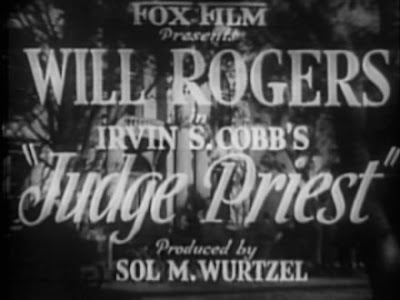Another movie title that is pretty much nonsensical, because steel didn't play much of a part in this movie, blue or otherwise. Main theme: hero has secret identity, is thought to be outlaw. Sub-theme: dying town is sitting on top of gold mine, only bad guy knows about it.
There are some things about this movie that make me put it into the "yes, you should watch it" category. If only for this.

A surreal and utterly bizarre opening scene has these two newlyweds coming into the inn on a dark and stormy night. "So, you're newlyweds?" the innkeeper asks. Above is the couple's reaction. I can't discover the name of the woman who played the bride. The groom is George Nash, who was in 29 movies between 1914 and 1934, including Hollywood's first talkie version of
Oliver Twist in 1933.
Blue Steel was his last movie, and he died ten years later.

"You'll be wanting the bridal suite?" They seem shocked at the innkeeper's inference. But of course they do want it, because it's the "best room in the house." As they began to climb the stairs to their room, the innkeeper cautions them, "Don't make too much noise, the fellow next to you has to wake up at five o'clock." A few minutes later, the groom comes back down stairs.

Groom: "I can't find it."
Innkeeper: "You can't?"
"Nope."
"Well, what ever have you lost?"
"I ain't lost nothin'."
"Well, what in the world is it that you can't find?"
"Well, it's uh...huh huh huh..."
And the innkeeper walks him back up the stairs to his room, speaking reassuringly yet unintelligibly all the while. I think the weirdness of this simply put it over the heads of the National Board of Review. If they had had any idea of the innuendos being churned out in these few minutes they would have FAILed this movie in a heartbeat. I had to rewind this and watch it several times. It's like Robert Bradbury (the director) was channeling a David Lynch
Twin Peaks dream sequence through time. Yes, watch the movie only for this. But now on to the main body of the movie. Oh yeah, this little scene had
absolutely nothing whatsoever to do with the rest of the movie.

We get to see George Hayes take a decided turn toward the Gabby. Yes, I think I can safely say that in this movie his essential Gabbiness begins to shine through, and his manner of speech takes several steps toward authentic frontier gibberish. He plays Sheriff Jake Withers, who thinks our hero is a famous criminal called "The Polka Dot Bandit" but befriends him anyway because they both keep getting beset by the
real bad guys. Speaking of which...

Zoinks! It's the ghost of
Slippery Morgan! Actually it's another veteran character actor named Earl Dwire, who was in 157 movies between 1921 and 1940 (the year he died), but he sometimes played a good guy. In this movie, he has another henchman role. In thise scene he is looking quietly suspicious because he's the bad guy surrounded by a bunch of townsfolk who are trying to figure out who the bad guys are.

On the left is Eleanor Hunt, who played Betty Mason, the beautifully doe-eyed but annoyingly feckless damsel in distress. On the right is her father Dan Mason, a.k.a. The Guy Who Gets Shot (seriously, he should be wearing a red shirt) played by another actor we've seen before, Lafe McKee.

A good shot here of George Hayes and John Wayne. Gabby isn't talking here. He simply continues to placidly chaw his 'baccy even while threatened at gunpoint. He chaws throughout the whole movie. I guess they decided pipe smoking wasn't Gabby enough.

I like this shot because we see three long-time character actors all together. At the left is Edward Peil, Sr. (398 movies between 1913 and 1951) playing main bad buy Malgrove, Earl Dwire center rear, and legendary stuntman and sometime actor Yakima Canutt playing Danti, the Polka Dot Bandit on the right. Canutt once again plays the leader of the outlaw gang, or perhaps I should say the head henchman. He gets his nickname because he wears a polka dot bandanna to cover his face when he commits crimes.

Here is an excellent close up of Yakima Canutt, and an unusually sharp screen cap this turned out to be.
And now, to set up the next picture: Carruthers (Wayne) is fighting a henchman. Another henchman climbs on the roof of a barn and tries to cut a rope that is holding this hay bale so it will fall on Carruthers. Sheriff Withers (Hayes) shoots the henchman off the roof. Carruthers runs off to do something else. Malgrove and an unnamed henchman walk up to plot further evil machinations.

"It's the things we least expect that usually happen," says Malgrove. This, and the newlywed scene, are really the only comical parts of this movie. Unlike many such movies, there are no humorously clumsy sidekicks or bumbling henchman to provide comic relief.

"Tell me briefly what's happened," says Carruthers. They should have this scene in every movie! It helps a lot to have the damsel in distress fill in all the plot holes in a quick 30-second recap of everything that's supposedly happened so far.

"Stand back, I'm gonna hack the window open with an axe. Because, uh...the door is right around the corner and...uh...there's a henchman about 8 feet away and he'll...Awww, heck. Bradbury said to use an axe, so just stand back!"
Right around in here somewhere, at about the 40 minute point, there's a fight scene between Carruthers and a henchman. You can hear a rooster constantly crowing in the distance and then a car accelerating.

And then we have yet another strange scene. Betty flees on her horse, Carruthers follow on his horse, and Withers follows them with a wagon. Betty's horse gets shot from under her, she hits the ground and falls flat like this.

So Carruthers leaps off his horse onto the team that's pulling the wagon.

Like this.

So they can drive the team directly over the top of Betty, who seems to have flipped around so her feet are now pointing the other direction for some reason, and he can scoop her up...

And bodily hurl her onto his horse so she can ride away. It seems quite a complicated way to go about picking up the damsel, but I guess the stuntmen have to do something.

This is what I've come to think of as the standard "You're
what?!" scene (note Gabby's expression). Carruthers has just said something like, "Betty doesn't know it yet, but she's coming with me to Sacramento so we can get married. P.S. I'm the U.S. Marshall--I think I forgot to mention that."

And so forth.
This movie has some really beautiful scenic footage. That is, I suppose it was quite breathtaking, even in black & white, on the big screen in 1934, but it doesn't translate too well to modern sensibilities, and there's no way I could give you any idea what it's like with these small pictures on a computer screen.
So yeah, this movie is worth watching. One, for the newlywed scene; and two, because it was one of the earliest appearances of His Gabbiness before he actually started using the name "Gabby."
Source:
Western Classics 50 Movie Pack Collection
Runtime: 54 minutes
Amazon Search:
Blue Steel













































